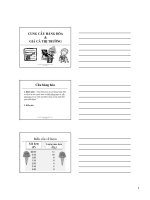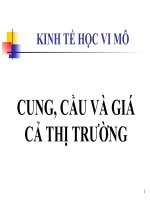KINH TẾ VI MÔ Chapter 2 for student
Bạn đang xem bản rút gọn của tài liệu. Xem và tải ngay bản đầy đủ của tài liệu tại đây (115.31 KB, 13 trang )
Chapter 2
DEMAND AND SUPPLY
Content
+ Demand
+ Supply
+ Market equilibrium
1
I. Demand
1. Definitions
2. The law of demand
3. Demonstrating demand
4. Determinants in demand function
5. Movement and shift of demand curve
I. Demand
1. Definitions
-
Demand (D): The quantity of goods and services that consumer is
willing to buy and afford to buy at various price level in a certain time,
ceteris paribus.
-
Quantity demanded (QD): The quantity of goods and services that
consumer is willing to buy and afford to buy at a price level in a certain
time, ceteris paribus.
-
Individual demand
-
Market demand
2
I. Demand
2. The law of demand
P
QD
P
QD
I. Demand
3. Demonstrating demand
- Demand schedule
- Demand curve
- Demand function
P = - aQD + b
QD = - aP + b
QD = f (Px, Py, I, T, E, N)
P
A
P1
P2
B
Q1
Q2
Q
3
I. Demand
4. Determinants in demand function
4.1. Price of related goods (PY)
- Substitutes goods: A and B are substitutes if the usage of A can
be replaced by the usage of B, provided that the initial
consumption target is unchanged
I. Demand
4. Determinants in demand function
4.1. Price of related goods (PY)
- Complements goods: A and B are complements if the usage of
A must go together with the usage of B to ensure the initial
utility of both goods
4
I. Demand
4. Determinants in demand function
4.2. Income of consumer (I)
I
QD
Normal goods
QD
I
I
QD
Inferior goods
I
QD
I. Demand
4. Determinants in demand function
4.2. Income of consumer (I)
- Engel curve: Attitude
I
toward any goods
depends on buyer’s
income, not on goods’
quality
Q
5
I. Demand
4. Determinants in demand function
4.3. Taste of consumer (T)
4.4. Expectation of consumer (E)
4.5. Number of consumer (N)
I. Demand
5. Movement and shift of the demand curve
- Movement: PX
- Shift: The rest determinants
P
P
Q
Q
6
Question
1. Chicken and fish are substitutes goods.
a. The decrease in chicken’s price causes a
movement in fish’s demand curve
b. The increase in chicken’s price causes a left
shift in fish’s demand curve
II. Supply
1. Definitions
2. The law of supply
3. Demonstrating supply
4. Determinants in supply function
5. Movement and shift of supply curve
7
II. Supply
1. Definitions
Supply (S): The quantity of goods and services that
supplier is willing to supply and able to supply at various
price level in a certain time, ceteris paribus.
-
Quantity supplied (QS): The quantity of goods and
services that supplier is willing to supply and able to supply
at a price level in a certain time, ceteris paribus.
-
Individual’s supply (firm’s supply)
-
Market supply
II. Supply
2. The law of supply
P
QS
P
QS
8
II. Supply
3. Demonstrating supply
- Supply schedule
P
- Supply curve
P
- Supply function
P = aQS + b P
QS=aP + b
QS = f (Px, Pi, G, Te, E, N) Q
2
1
1
Q2
Q
II. Supply
4. Determinants in supply function
4.1. Price of inputs (Pi)
Pi
Pi
C
C
Profit
QS
Profit
QS
4.2. Government’s policies
4.3. Technology
4.4. Expectation
4.5. Number of supplier
9
II. Supply
5. Movement and shift of the supply curve
- Movement: PX:
- Shift: The rest determinants
P
P
S
S1
Q
Q
III. Market equilibrium
1. Equilibrium status
2. Surplus and shortage
3. Price controlling
10
III. Market equilibrium
1. Equilibrium status
- Status in which quantity
demanded equals to
quantity supplied
- - Merger demand schedule
and supply schedule
P
S
PE
E
D
P = -aQD + b
P = cQS + d
E (PE, QE)
QE
Q
- Intersection of (S) and (D)
-
III. Market equilibrium
2. Surplus and shortage
- Shortage
+ P2 < PE
+ QS < QD => shortage
+ Appear market’s
pressure to make P2
return to the equilibrium
price
PE
QE
Shortage
11
III. Market equilibrium
2. Surplus and shortage
- Surplus:
+ P1 > PE
P1
+ QS > QD => surplus
PE
+ Appear market’s
pressure to make P2
return to the equilibrium
price
QE
Surplus
III. Market equilibrium
3. Price controlling
- Controlled by the Government
- Ceiling price (PC)
+ The highest price allowed
in the market
+ For the sake of buyer
+ Appear shortage
+ Government’s responsibility
PE
E
QE
12
III. Market equilibrium
3. Price controlling
- Floor price (PF)
+ The lowest price allowed
in the market
PE
+ For the sake of supplier
+ Appear surplus
+ Government’s responsibility
QE
13









